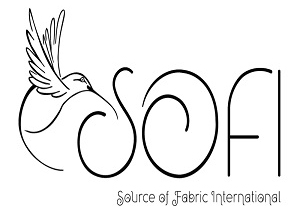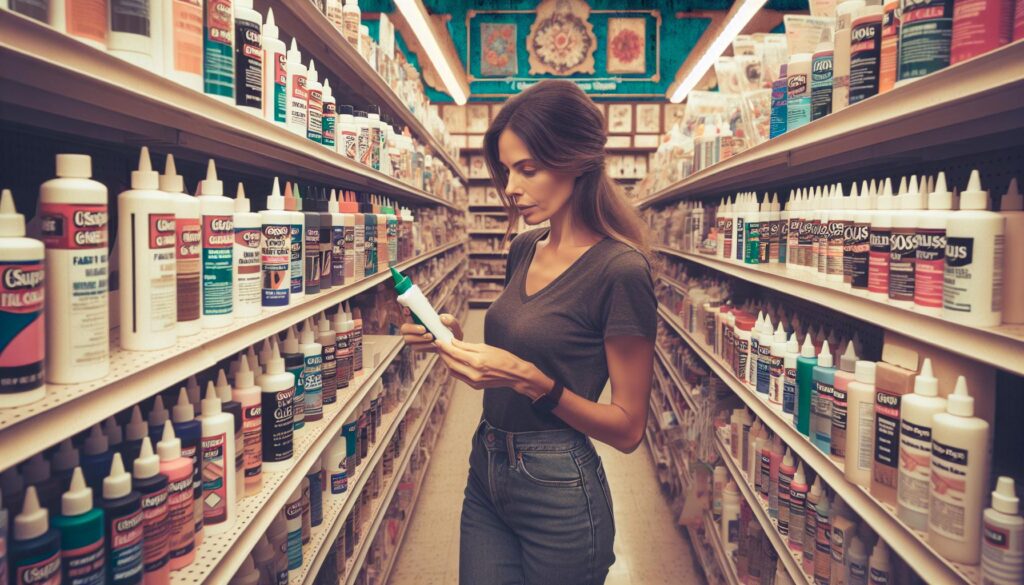If you’re diving into a DIY project or tackling some fabric repairs, having the right supplies is crucial. Fabric glue can be a game-changer, allowing you to bond materials without the hassle of sewing. But where can you find this essential crafting tool?
You’ve got plenty of options at your fingertips. From local craft stores to popular online retailers, fabric glue is widely available. Whether you’re looking for a quick fix or planning an elaborate project, knowing where to buy fabric glue can save you time and effort. Let’s explore the best places to stock up on this versatile adhesive, ensuring you have everything you need to bring your creative ideas to life.
Understanding Fabric Glue
Fabric glue serves as an effective way to bond fabric materials without the need for sewing. Understanding the properties and uses of fabric glue helps in selecting the right type for your projects.
What Is Fabric Glue?
Fabric glue is a specialized adhesive formulated to bond fabric to fabric and other materials. It dries clear and remains flexible to preserve the fabric’s natural movement. Fabric glue enhances your projects by providing a strong hold for hems, patches, and embellishments. It offers a quick solution for repairs and crafts while avoiding the time and skill involved in sewing. Most fabric glues can be washed and are safe for most fabrics. Always check the label for specific instructions and drying times.
Types of Fabric Glue Available
Fabric glue comes in various types suited for different applications:
- Permanent Fabric Glue: Strong hold for long-lasting projects like clothing and home décor. Ideal for items needing frequent washing.
- Temporary Fabric Glue: Washable and easy to remove, great for basting fabric before sewing or repositioning pieces.
- Fabric Glue Sticks: Convenient for quick fixes and casual projects. Works well with fabric and is easy to apply using a glue gun.
- Fabric Spray Adhesive: Offers an even coat for large surfaces. Best used for quilt basting or attaching fabric to other materials like foam or cardboard.
- Fabric Fusible Adhesive: Comes in sheets or tapes that bond fabric when heat is applied. Excellent for hems and appliqués.
- 3D Fabric Glue: Designed for embellishing fabric with beads, rhinestones, and other decorative items.
Choosing the right type of fabric glue ensures optimal results for your crafting or repair needs.
Where Can You Buy Fabric Glue?
Finding fabric glue for your projects occurs at several types of stores and online platforms. Knowing where to look helps you quickly source this essential crafting supply.
Local Retail Stores
Local retail stores offer a variety of options for purchasing fabric glue. Craft stores, such as Michaels and Joann, typically carry a wide selection of fabric adhesives, including permanent, temporary, and specialty types. These stores often provide guidance from staff members who can assist you in choosing the right product for your specific needs.
In addition to craft stores, big box retailers like Walmart and Target often stock fabric glue in their craft or sewing sections. These stores frequently offer competitive prices and convenient locations, making it easier for you to find what you need.
Specialty fabric stores also serve as great options. These stores focus exclusively on textiles and sewing supplies, offering various fabric glues tailored to their product range. Often, the staff at these locations possess significant knowledge about fabric adhesives, providing valuable recommendations.
Be sure to check the aisles dedicated to sewing and crafting for the best chances of finding fabric glue. Always compare brands and types available, considering factors like drying time and flexibility to ensure you select the best adhesive for your project.
Online Retailers
Finding fabric glue online provides convenience and wider options. Numerous websites offer a variety of brands and types to suit your crafting needs.
Major E-commerce Websites
Amazon offers a wide selection of fabric glue options, including brand varieties and user reviews. eBay provides both new and used adhesive products often at competitive prices. Walmart‘s online store has fabric glue available for delivery or pickup, and Target‘s website also features a range of fabric adhesives with clear descriptions and customer ratings. These major e-commerce platforms allow you to compare brands, sizes, and prices easily. Use filters to narrow down your choices based on customer ratings or specific types of glue you need.
Specialty Stores
Joann operates an online store that specializes in fabric and craft supplies, offering a focused selection of fabric glues. Michaels also has an online storefront where you can find various fabric adhesive products suitable for different projects. Fabric.com focuses on sewing and fabric needs, providing a dedicated selection of glue options for crafters. Purchase direct from specialized sources gives access to expert advice and product details often absent in larger retailers. Review shipping options and potential crafting tips listed on these sites to enhance your shopping experience.
Comparison of In-Store vs. Online Shopping
In-store shopping and online shopping both offer distinct advantages when it comes to buying fabric glue. Understanding the differences can lead to better purchasing decisions.
In-Store Shopping Benefits
- Immediate Purchase: You can grab fabric glue from the shelf, eliminating waiting time for shipping.
- Physical Inspection: Touch the product and check its viscosity and packaging, ensuring it meets your needs.
- Local Support: Local staff can provide advice and recommendations based on their experience.
- No Shipping Fees: Save additional costs that might arise from online orders.
- Instant Availability: Buy fabric glue for last-minute projects without delays.
In-Store Shopping Considerations
- Limited Selection: Local craft stores may have fewer brands and types of fabric glue compared to online retailers.
- Time Consumption: Visiting stores takes time; it may involve commuting and navigating through aisles.
- Crowded Stores: Busy hours could lead to long lines and less shopping convenience.
Online Shopping Benefits
- Wider Variety: Online platforms provide extensive choices with numerous brands and products available.
- Convenience: Shop from home at any time without the need for traveling.
- Customer Reviews: Access customer feedback and ratings to guide your product choice.
- Comparative Pricing: Easy comparison of prices across different sites can lead to better deals.
- Detailed Descriptions: Read in-depth information about product uses, drying times, and application methods.
Online Shopping Considerations
- Shipping Time: Orders take time to arrive, which can be problematic for urgent projects.
- Shipping Costs: Watch for extra charges that may apply and affect total spending.
- Return Process: Returning items can be more complicated compared to immediate exchanges in-store.
- Conclusion
Tips for Choosing the Right Fabric Glue
Selecting the best fabric glue for your project involves understanding your specific requirements. Consider the following factors to make an informed choice.
Consider the Project Type
Determine the purpose of your project before selecting a fabric glue. Different projects require different adhesives. For simple repairs, permanent fabric glue works well, providing a strong bond. If you plan to make temporary adjustments or use fabric for display, temporary fabric glue is ideal, allowing for easy removal. For embellishments or layered fabrics, 3D fabric glue offers additional support and texture. Always match the glue type with your project’s needs to achieve the best results.
Check for Washability
Evaluate the washability of the fabric glue, especially if the fabric will undergo frequent washing. Washable fabric glues withstand multiple laundering cycles without losing adhesion. Look for product labels indicating machine wash compatibility, as this feature ensures that your repair remains intact after cleaning. If your fabric project includes clothes or home textiles that need regular washing, opt for washable adhesives to maintain durability and performance over time.
Look for Drying Time and Flexibility
Examine the drying time and flexibility of the fabric glue, as these factors significantly impact your project. Quick-drying glues allow for immediate handling. This feature is useful if working on time-sensitive projects. Conversely, if your project involves delicate fabric, choose a glue that remains flexible after drying. This quality prevents cracking, maintaining the comfort and drape of the fabric. Always read product descriptions and user reviews to find fabric glue that meets these criteria for your specific needs.
Budgeting for Fabric Glue
Understanding costs associated with fabric glue helps in planning your crafting budget efficiently. Fabric glue typically comes in various price ranges depending on the brand, type, and size of the container.
Price Range Overview
Fabric glue prices vary widely. On average, small tubes or bottles cost between $2 and $7. Larger containers or specialty glues may range from $8 to $20. Permanent glues usually fall on the higher end of the spectrum, while temporary options tend to be more affordable. Specific adhesive types such as fabric glue sticks or spray adhesives often cost between $5 and $15. Knowing price ranges allows you to choose the right product that fits both your project needs and your budget.
Discounts and Deals
Finding discounts and deals can significantly reduce the cost of purchasing fabric glue. Many local craft stores and big box retailers offer frequent sales, especially during holidays or special events. Online platforms like Amazon, eBay, and retailer websites often feature promotional discounts. Look for coupons in your local newspaper, store flyers, or on websites. Signing up for newsletters from major retailers can also provide exclusive access to deals. Taking advantage of these savings can enhance your purchasing power while allowing for larger projects or multiple types of fabric glue for various applications.
Troubleshooting Common Issues
When purchasing fabric glue, several common problems may arise. Identifying and addressing these challenges ensures a smoother crafting experience.
How to Avoid Mistakes When Buying Fabric Glue
To avoid errors when selecting fabric glue, research specific project requirements. Evaluate the type of material you use. Understand if you need permanent or temporary adhesive. Review product labels for washability and flexibility. Verify customer reviews for insights on performance and durability. Compare prices across several retailers for the best deal. Examine tube or container size based on the project scale. Check for compatibility with your fabric types to ensure a solid bond. Look for brands with a good reputation for crafting supplies. Following these steps greatly reduces the chance of purchasing unsuitable glue.
Dealing with Sticky Situations
In the event of issues with fabric glue during your project, prompt action matters. If glue seeps out when applying, use a cotton swab to clean edges before it dries. If you find fabric not sticking, consider clamping or weighting down the pieces until the adhesive sets. If the adhesive dries too quickly, avoid applying too much at once to prevent mess. If a project requires repositioning, try using temporary glue to allow adjustments without damage. If the glue fails to hold after drying, revisit compatibility with materials and select a stronger adhesive. Anticipating these problems makes your crafting time more enjoyable and efficient.
Conclusion
Finding the right fabric glue is essential for your DIY projects and fabric repairs. Whether you choose to shop at local craft stores or browse online, you have plenty of options to explore. Each location offers its unique benefits and a variety of products to suit your specific needs.
As you embark on your crafting journey, remember to consider factors like drying time, flexibility, and washability. By understanding your project requirements and budget, you can make informed decisions that enhance your crafting experience. Don’t hesitate to take advantage of sales and expert advice available both in-store and online. Happy crafting!
Frequently Asked Questions
What is fabric glue used for?
Fabric glue is a specialized adhesive designed to bond fabric to fabric, and to other materials, without the need for sewing. It’s ideal for hems, patches, and embellishments, providing a quick solution for repairs and creative projects.
Where can I buy fabric glue?
You can find fabric glue at local craft stores like Michaels and Joann, big box retailers such as Walmart and Target, as well as specialty fabric stores. Online options include platforms like Amazon and eBay for a wider variety and convenience.
What types of fabric glue are available?
There are several types of fabric glue, including permanent, temporary, glue sticks, spray adhesive, fusible adhesive, and 3D fabric glue. Each type serves different purposes, so it’s essential to choose according to your project’s needs.
How do I choose the right fabric glue?
To select the appropriate fabric glue, consider your project’s requirements. Evaluate the type of bond needed (permanent or temporary), the materials being used, washability, drying time, and flexibility to ensure the best results.
What should I consider when budgeting for fabric glue?
Fabric glue prices vary based on type and size. Small tubes typically range from $2 to $7, while larger or specialty options can cost between $8 and $20. Look for sales, coupons, and discounts to maximize your budget.
What are the advantages of in-store shopping for fabric glue?
Shopping in-store allows you to immediately purchase and inspect products physically, receive local support, and avoid shipping fees. However, you may encounter limited selections and time constraints.
What are the benefits of online shopping for fabric glue?
Online shopping provides a wider variety of fabric glue options, convenience, customer reviews for informed decisions, and typically better pricing. However, it may involve shipping delays and costs.
How can I troubleshoot common issues with fabric glue?
To troubleshoot, research your project’s requirements, check the compatibility of materials, and read product labels for washability and flexibility. For sticky situations, clean excess glue, use clamps for better adhesion, and ensure proper application.


